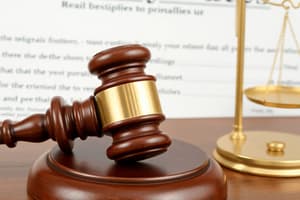Podcast
Questions and Answers
What must a bank's by-laws include when engaging in trust and fiduciary business?
What must a bank's by-laws include when engaging in trust and fiduciary business?
- Provisions on the organization plan of the trust department (correct)
- Provisions on customer service protocols
- Provisions on financial auditing processes
- Provisions on client marketing strategies
Which statement about the trust department is correct?
Which statement about the trust department is correct?
- It must be operationally separate from other departments. (correct)
- It must perform investment management activities outside its structure.
- It should be integrated with all other bank departments.
- It can report to the Treasury department for oversight.
Who is the trust committee directly responsible to?
Who is the trust committee directly responsible to?
- The bank’s clients
- The bank's trust officers
- The bank's regulatory body
- The bank’s board of directors (correct)
What is a primary responsibility of the trust committee?
What is a primary responsibility of the trust committee?
Which of the following is NOT a requirement for trust and fiduciary business?
Which of the following is NOT a requirement for trust and fiduciary business?
What role does the board of directors have regarding the trust department?
What role does the board of directors have regarding the trust department?
What must the trust department ensure when conducting its activities?
What must the trust department ensure when conducting its activities?
What does effective transmission of material facts to clients enable?
What does effective transmission of material facts to clients enable?
What is the cardinal principle that governs all trust and fiduciary relationships?
What is the cardinal principle that governs all trust and fiduciary relationships?
Which of the following best describes the requirement of prudent administration in fiduciary activities?
Which of the following best describes the requirement of prudent administration in fiduciary activities?
In fiduciary responsibility, whose interests should take priority?
In fiduciary responsibility, whose interests should take priority?
What is a key aspect of managing conflicts of interest in fiduciary relationships?
What is a key aspect of managing conflicts of interest in fiduciary relationships?
What does the doctrine of non-delegation of responsibilities emphasize in fiduciary management?
What does the doctrine of non-delegation of responsibilities emphasize in fiduciary management?
How should fiduciary assets be handled according to the principles of preserving and protecting property?
How should fiduciary assets be handled according to the principles of preserving and protecting property?
What is required regarding the keeping and rendering of accounts in fiduciary activities?
What is required regarding the keeping and rendering of accounts in fiduciary activities?
Which of the following is NOT a principle to be observed in fiduciary relationships?
Which of the following is NOT a principle to be observed in fiduciary relationships?
Flashcards are hidden until you start studying
Study Notes
Cardinal Principle of Fiduciary Relationships
- Fidelity is the foundational principle governing trust and fiduciary relationships.
Prudent Administration
- Administration of fiduciary accounts must align with the client's intentions as stated in the agreement.
- Requires skill, care, prudence, and diligence akin to actions of a knowledgeable man in similar circumstances.
Undivided Loyalty and Utmost Care
- Clients' interests must take precedence over the bank's interests.
- Cohesive policies must address conflict of interest scenarios.
- Administration of fiduciary assets must ensure fairness, and respect beneficiaries' interests.
Non-delegation of Responsibilities
- Trust and fiduciary responsibilities must not be delegated; client trust relies on personal performance by the fiduciary.
Preserving and Protecting Property
- Reasonable care is required to safeguard property entrusted to fiduciaries.
- Fiduciary assets must be legally distinct from proprietary assets and other fiduciary accounts.
Keeping and Rendering Accounts
- Accurate records of all transactions must be maintained.
- Reports of fiduciary accounts must be provided to relevant parties, ensuring transparency and access to information that aids informed decisions.
Organization and Management
- Authorized banks must have by-laws governing the structure and organization of their trust operations.
- Establishes role of a trust committee and trust officer with defined responsibilities within a dedicated trust department.
Separation of Trust Operations
- Trust business must operate independently from other bank departments (e.g., Treasury, Funds Management).
- Investment management activities must also be conducted exclusively through the trust department.
Responsibility and Accountability Structure
- Trust department personnel are accountable to the trust committee, which reports to the board of directors.
- The board must maintain independence between the bank's operations and its trust department.
Trust Committee Functions
- Special committee responsible for overseeing fiduciary activities, ensuring compliance with laws and regulations.
- Establishes policies that reflect the board’s strategic objectives and risk tolerance in fiduciary practices.
Studying That Suits You
Use AI to generate personalized quizzes and flashcards to suit your learning preferences.




